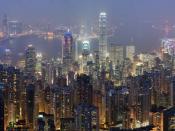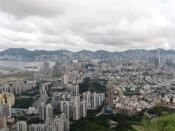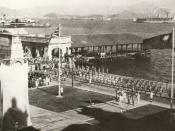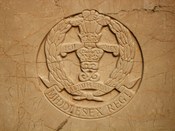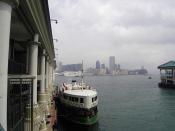Hong KongÃÂs PreparationAs a whole of all the British Forces that were defending Hong Kong, we lacked preparation to whom we were going to battle. As a member of the Middlesex Regiment, I think we were the most prepared out of all the other troops that were sent to Hong Kong since we were trained as the machine gun battalion while all the other troops hardly ever used grenades or antitank guns. In a total of 900 men that were sent to Hong Kong representing the Royal Scots, their most experienced officers were sent back to Europe while leaving some, that were not determined to train and be prepared but would rather play baseball instead while the others had been sick with Malaria. All the part time Winnipeg Grenadiers and the Royal Rifles of Canada were too young and have not completed any basic training at all, that adds up to 2000 men having a lack of training.
The Rajputs and Punjabis had all their experienced officers and troops in Europe and India, strengthening Hong Kong with hastily trained troops. The last group defending Hong Kong were the Hong Kong Volunteer Corps, they had 1000 men that were too old for the professional army but were amazingly enthusiastic to fight in defence of their home and they knew the local area well. Adding on to all that, rumours were passed around us about how the Japanese could not see well at night and needs glasses and we were only expecting 5,000 Japanese troops instead of the actual total of 50,000 well trained and experienced troops that attacked us equipped with a strong air force. Each of their troops took part in many victories in defeating China.
The policy of the British Government towards Hong KongThe policy of the British Government towards Hong Kong was to never surrender because even if we lose at the end, it would still delay their attacks on other Asia countries but if we just surrendered, the Japanese would win and conquer all of Asia. Mr. Winston Churchill putted off the Japanese and also lifted our spirits in those who were defending Hong Kong by announcing there would not be the slightest chance of the Japanese taking over Hong Kong when he clearly knew Japan was too strong to defend.
The events that revealed about the defences of Hong KongThe events that revealed about the defences of Hong Kong include the Gindrinkers Line that did not hold as long as they expected it to and the abandoning of the Shingmun Redoubt. The main defence was the Gindrinkers line, but we had a lack of soldiers accompanied with five outdated war crafts and two air-guns to protect it that ended up a total failure within the couple of hours that took the Japanese to break the Gindrinkers line that was supposed to last for weeks. By having the Japanese taking over our reservoir, it proves to us that we were not as well rounded and we did not think about everything that would affect us thoroughly enough. We were then sent to Lai Chi Kok to prevent Japanese from moving further forward but no major attack was launched. The next attack was towards the Shingmun Redoubt, which was very vulnerable to attack. We all expected the redoubt would stop the enemy moving into the Shingmun river valley, but unfortunately we were wrong. They started at night against the PunjabiÃÂs position, the line that joined the Royal Scots line at Shingmun. All the reserves from Rajputs were moved to strengthen the area. After 23:00, Japanese reported to be moving down the Shingmun Valley and they started a series of heavy enemy pressure and explosions in the Pineapple Pass area. By midnight, the redoubt had fallen. Within a few days, all our major defences were torn down by the Japanese which confirms to us that our defences were not strong enough.
The Surrender of the British Forces defending Hong KongIn my opinion, I do not think the British Forces defending Hong Kong should have surrendered earlier because if they all did not surrender, it would slow down the JapaneseÃÂs advance through conquering the whole of Asia. Even though many soldiers were sacrificed in the battle while they were defending Hong Kong, they might die after the surrender under the orders and treatment the Japanese gave them. The Japanese treated the remaining soldiers very badly like not giving them enough food which caused starvation and a lot were bayoneted, shot and burned since the Japanese did not like keeping prisoners. The Japanese also thought that having to surrender was considered dishonourable and would kill them immediately because they think that it would help the person who surrendered be honourable.
Bibliography:http://www.hksw.org/despatches_106_1_j.htm
